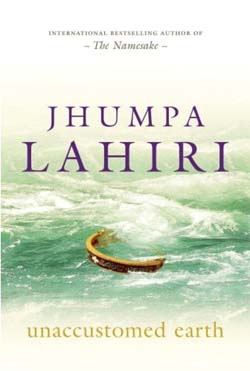Apr 16, 2024
Apr 16, 2024
by Manish Chand
 Jhumpa Lahiri has an uncanny gift for turning 'unaccustomed earth' into a familiar habitat of fiction where she consorts with upwardly mobile immigrant Bengalis enacting their exquisite little dramas of belonging and un-belonging, of losing and finding themselves all over again.
Jhumpa Lahiri has an uncanny gift for turning 'unaccustomed earth' into a familiar habitat of fiction where she consorts with upwardly mobile immigrant Bengalis enacting their exquisite little dramas of belonging and un-belonging, of losing and finding themselves all over again.
The eight stories in Lahiri's new book, a genre she has refined since her debut Pulitzer Prize-winning "Interpreter of Melodies", are on transformations intrinsic to the immigrant experience when seemingly rooted people are transplanted into the American soil.
The title story "Unaccustomed Earth" links up to a passage in Nathaniel Hawthorne's novel "The Custom House" that suggests human nature may atrophy if people continue to toil in the same worn out soil. Hawthorne's exhortation, "strike your roots into unaccustomed earth," could as well be an anthem for Lahiri's cast of upper middle class, expatriate Bengali suburbanites venturing into foreign shores - read the Boston-New York corridor - to rebuild their homes and identities afresh.
In the accomplished title story, a widower father visits his daughter, who has recently moved to Seattle with her husband and son. When the daughterly impulse strikes her, she is solicitous about her father as he takes off on frequent package tours to various European countries and wants him to move in with her. But even as she juggles with her fears and concern, she discovers that her father has found a private world of his own with a spirited Bengali widow and has come to a point where he thinks he can live without the cloying comforts of a family fussing over him. "The entire enterprise of having a family, of putting children on this earth, as gratifying as it sometimes felt, was flawed from the start," her father muses.
In "Heaven-Hell", the author gently dramatises the affections of a bored Bengali housewife for a much younger Bengali man longing for homemade Bengali delicacies to bring out the loneliness and the ache of longing in an alien land. The fiction of cultural assimilation, however, comes apart when the young lover gets married to an American woman, stays with her for over two decades before divorcing her. Cultural divides are not easy to bridge in trans-cultural marital unions. "I was so horribly jealous of you back then, for knowing him, understanding him in a way I never could," the American woman confesses to the Bengali woman.
The theme of female jealousy is again amplified in "A Choice of Accommodations" in which a Bengali man married to an American woman goes to attend the wedding of his prep school crush and finds his wife secretly obsessing about the persisting psychic hold of childhood romance on her husband.
In her three beautifully told stories, grouped together as "Hema and Kaushik," the demons of love and longing wrestle with implacable realities of the present, making the reunion of lovers an inevitable prelude to a final tragic rupture.
In a crowded intellectual mart with their genre cafes, it would be easy to label Lahiri's stories as yet another variant of immigrant fiction, coalescing kindred themes of cultural hybridity and uprootedness, but the universality of her themes and emotions they conjure up lift them to a much larger dimension of human experience of finding "kinship and beauty in unexpected places." In other words, these stories, which eschew the temptation of being anything other than stories well told, could be located anywhere and speak not just to those who are familiar with the culturally schizophrenic world of immigrants.
"Being a foreigner is a sort of lifelong pregnancy - a perpetual wait, a constant burden, a continuous feeling out of sorts," reflects the mother who has been moved from Calcutta (now Kolkata) to Cambridge, Massachussetts, in Lahiri's novel, "The Namesake" (2003). Shuttling between three worlds - born in Britain, raised in Rhode Island and taken on long visits to India - has made Lahiri all too aware of "intense pressure to be two things, loyal to the old world and fluent in the new."
"Unaccustomed Earth" affirms the 41-year-old author's gift for transmuting this sense of cultural dividedness into her redemptive worlds of fiction.
29-Apr-2008
More by : Manish Chand